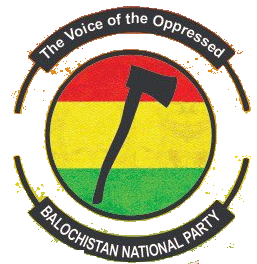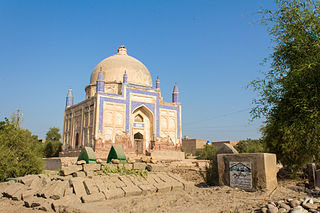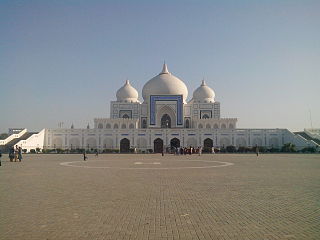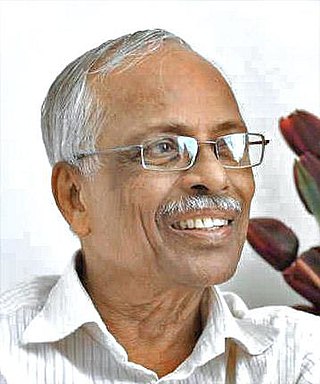This article needs additional citations for verification .(February 2024) |
| |||||
| Decades: | |||||
|---|---|---|---|---|---|
| See also: | |||||
Events from the year 1972 in Pakistan.
This article needs additional citations for verification .(February 2024) |
| |||||
| Decades: | |||||
|---|---|---|---|---|---|
| See also: | |||||
Events from the year 1972 in Pakistan.

Zulfikar Ali Bhutto was a Pakistani barrister, politician, and statesman. He served as the fourth president of Pakistan from 1971 to 1973 and later as the ninth prime minister of Pakistan from 1973 to 1977. Bhutto founded the Pakistan People's Party (PPP) and served as its chairman until his execution.

The National Awami Party (NAP), translated from Urdu to English as National People's Party, was the major left-wing political party in East and West Pakistan. It was founded in 1957 in Dhaka, erstwhile East Pakistan, by Abdul Hamid Khan Bhashani and Yar Mohammad Khan, through the merger of various leftist and progressive political groups in Pakistan. Commonly known as the NAP, it was a major opposition party to Pakistani military regimes for much of the late 1950s and mid-1960s. In 1967, the party split into two factions.

Begum Nusrat Bhutto was an Iranian-born Pakistani public figure who served as the first lady of Pakistan from 1971 to 1977, as the wife of Zulfikar Ali Bhutto, who served as the President and Prime Minister of Pakistan. She also served as a senior member of the federal cabinet between 1988 and 1990, under Benazir Bhutto's government.

Ataullah Mengal was a Pakistani politician and feudal figure. He was the head of the Mengal tribe until he nominated one of his grandsons, Sardar Asad Ullah Mengal, as his tribal successor. He was also the 1st Chief Minister of Balochistan during Zulfikar Ali Bhutto's premiership from 1 May 1972 to 13 February 1973. He died on 2 September 2021 in Karachi.
Shah Nawaz Bhutto, was a politician and a member of Bhutto family hailing from Larkana in the Sind region of the Bombay Presidency of British India, which is now Sindh, Pakistan.

The Balochistan National Party or Balochistan National Party (Mengal) (Urdu: بلوچستان نيشنل پارٹی ; Balūcistān Nēśanal Pārtī ) is a political party in Balochistan, Pakistan. BNP believes in more provincial rights and greater autonomy for Baluchistan province through peaceful and democratic struggle.

Larkana District is a district of the Sindh province of Pakistan. Its largest city is Larkana, which sits on the banks of the Indus River. It is the home district of the influential Bhutto family.

The Wali Khan faction of the National Awami Party was formed after the 1967 split in the original NAP between Maulana Bhashani and Abdul Wali Khan. The Wali Khan faction was later named National Awami Party (NAP) after the independence of Bangladesh.

Ghaus Bakhsh Bizenjo was a Pakistani politician from Balochistan. He served as the 3rd Governor of Balochistan.
Events from the year 1973 in Pakistan.
Mumtaz Ali Khan Bhutto, was a Pakistani politician who served as 8th Governor of Sindh and later the 13th Chief Minister of Sindh. He was also the first cousin of late Zulfiqar Ali Bhutto, who was the Prime Minister of Pakistan from 1973 to 1977.

Arshad Ali Bhutto Dadu
Events from the year 1971 in Pakistan.

The Sindh Muslim Government Law College or S. M. Law College is one of the oldest law schools of Pakistan, situated in Karachi, Sindh. The college has produced numerous notables including Chief Justices of Pakistan, Chief Justices of Federal Shariat Court, Chief Ministers of Sindh, Federal Ministers, and many judges of the Supreme Court of Pakistan and Sindh High Court.

Gul Khan Naseer also known as Malek o-Sho'arā Balochistan ; 14 May 1914 – 6 December 1983) was a Pakistani politician, poet, historian, and journalist from Balochistan. Most of his work is in Balochi language, but he also wrote in English, Urdu, Brahui and Persian.

The Bhutto family mausoleum is situated at Garhi Khuda Bakhsh, in Larkana District, Sindh, Pakistan. The mazar contains the graves of the Bhutto family, and is the burial place of Zulfikar, Murtaza, Shahnawaz, Nusrat, and Benazir Bhutto.

Khan Amirzadah Khan was a member of the Khudai Khidmatgar movement and a leader of the National Awami Party in Pakistan. Born in Bakhshali village, Mardan District in the province of Khyber Pakhtunkhwa, he was an active participant of Khudai Khidmatgar movement organized by Bacha Khan. Amirzada Khan started active politics with National Awami Party and remained President of National Awami Party District Mardan until 1972, when he remained senior Provincial Minister of Law, Education and Parliamentary Affairs.
1972 Language violence in Sindh occurred starting on 7 July 1972 when the Sindh Assembly passed The Sindhi Teaching, Promotion and Use of Sindhi Language Bill, 1972 which established Sindhi language as the sole official language of the province resulting in language violence in Sindh.

Biyyathil Mohyuddin Kutty was a Pakistani journalist, public servant, politician, peace activist, trade unionist, and liberal intellectual who worked for the betterment of India–Pakistan relations. Born to a family of peasants and landowners in Chilavil–Ponmundam village of Tirur, Malabar District, Madras Presidency, Kutty was influenced by communism at an early age and joined the student faction of the Communist Party of India in the 1940s. He attended Mohammedan College in Madras from 1945 to 1949 to please his father and there he joined the Muslim Students Federation. He left the college right after the final examinations and did not wait to receive his certificates. At the age of 19 he left his family and India for Pakistan, citing his "love for geography" as the motivation behind his move.